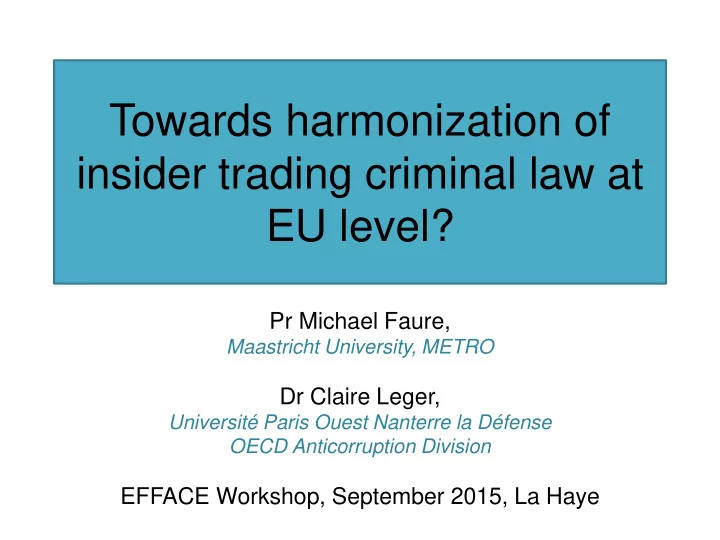

Towards harmonization of insider trading criminal law at EU level? Pr Michael Faure, Maastricht University, METRO Dr Claire Leger, Université Paris Ouest Nanterre la Défense OECD Anticorruption Division EFFACE Workshop, September 2015, La Haye
Scientific and societal relevance • Insider trading prohibition in Europe : around 1990 • Recent financial crisis : increasing demand for financial regulation • Internationalisation of the world’s securities market : challenges traditional notions of regulation and enforcement
• Evolution of EU criminal law 1999: the Maastricht Treaty: PJCC 2005: European Court of Justice Environmental Crime Judgment 2008: Environmental Crimes Directive 2009: Directive on Ship Source Pollution 2009: the Lisbon Treaty: Article 83(1) / Article 83(2) TFEU • Evolution of EU insider trading law 1989: Insider Dealing Directive 2003: Market Abuse Directive 3rd of July 2014: The Directive 2014/57/EU on Criminal Sanctions for Market Abuse: First to be based on the article 83(2) TFEU
Research questions 1) Is under all circumstances criminal law necessary to enforce insider trading laws? 2) Even if criminal law is prescribed in certain circumstances, should it be introduced at EU level?
Goal of the research and methodology • Law and economics theoretical approach to the criminalization of insider trading at EU level • Critical analysis of the Directive 2014/57/EU on criminal sanctions for market abuse
1/ Is criminal law necessary to enforce insider trading laws? • Deterrence theory • Public vs Private enforcement of laws: - Need for stringent sanctions in case of: Low probability of detection High social harm High gain - Low incentive to enforce the law by private party (insufficient financial gain, rational apathy, dispersed ownership, private interest, public harm)
• There is a need for the most stringent sanctions through criminal law in case of : - Very low probability of detection and apprehension, - Very high and substantial gain, - Very high social harm: large, immaterial, diffuse. • Qualities of criminal law that makes it a unique tool to achieve deterrence and incapacitation: - Exclusive availability of social incapacitation: needed to achieve deterrence (limited wealth) or incapacitation (violence or undeterrable offenders), - Inherent stigma reinforces the deterrence effect, - High procedural requirements: reduction of error cost.
• Insider trading dangerousness for society Not violent offenders, mostly first time offenders (67,5%). • Insider trading gain Median of $25,594, Mean of $215,696. • Insider trading harm Insider trading harms fairness and justice, Harm measurement is controversial from an economic perspective. • Insider trading’s probability of detection Immaterial and diffuse nature, International, anonymous trade based on legitimately acquired confidential information resulting from position, Insiders hide their trade, use proxies or intermediaries. • Insider trading’s probability of conviction Difficulty to establish: - the materiality, - the non-public quality of the information, - guilt.
Conclusion Criminal law is necessary to optimally deter insider trading.
2/ Should criminal insider trading law be introduced at EU level? Criminal insider trading law regimes of the Member States show divergences in: - types, - levels of sanctions, - procedures (cooperation and cumulation of sanctions), - resources allocated to enforcement (staff and budget), - enforcement of insider trading laws.
The Directive on criminal sanctions for market abuse, (article 83(2) TFEU) requires Member States: • To take the necessary measures to ensure that insider dealing constitutes a criminal offence (not the case in one country: Bulgaria)… • …When committed intentionally (Art.3) (not the case in 10 Member States: Cyprus, Germany, Denmark, Spain, Finland, Latvia, Malta, Netherlands, Sweden, United Kingdom), • … To ensure that insider trading is punishable by a maximum term of imprisonment of at least four years (Art.7) (not the case in 7 Member States: Belgium, France, Lithuania, Luxembourg, The Netherlands, Estonia, Hungary), • … To ensure that legal persons can be held liable for criminal insider trading (Art. 8) (not the case in 8 Member States: Bulgaria, Czech Republic, Germany, Greece, Luxembourg, Poland, Portugal, Sweden).
Economics of federalization approach : Normative legal standard setting VS method of enforcement setting • Inter-jurisdictional externalities Despite internationalization of the securities market insider trading problems are not always transboundary and cooperation may be sufficient to address them. • Jurisdictional competition Law being a product, competition amongst suppliers may results in a better satisfaction of consumer preferences : “Race to the top”. • Transaction costs Transaction costs savings are likely to be relatively small and substantial benefits can be gained from preference for differenciation : learning effects.
Commission legal perspective • Compliance with legal basis Art.83(2) TFEU? - Guidelines : COM(2011) 573 final “Towards an EU Criminal Policy: Ensuring the effective implementation of EU policies through criminal law”: art. 83(2) calls for clear reliance on empirical data regarding the essential need of introducing criminal sanctions at EU level Commission’s motivation and a rguments of abstract and - symbolic nature : based on conferences and consultations, No empirical evidence of ineffective enforcement at MS level or that criminalization at EU level would remedy those supposed problems.
Consistency of the Directive with the fundamental principles of criminal law? • Ultima ratio principle • Principle of subsidiarity • Principle of coherence • Principle of guilt
Conclusions • Economic theory casts doubt on whether there is effectively a need of imposing criminal sanctions at European level, • Arguments of the Commission to criminalize insider trading at European level are not convincing, • The contents of the Directive is to a large extent inconsistent with fundamental principles of criminal law, • The European Commission should first improve the functioning of private or administrative enforcement of insider trading laws at a EU level.
Thank you for your attention
Recommend
More recommend